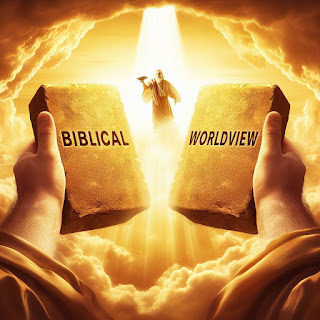I have a biblical worldview.
I know, I know, I'm not supposed to. According to the critics, having a Biblical worldview means you're on the far right of the right wing, at least in the shorthand of our culture's false binaries. It means you're a literalist, that you worship the bible as an idol, that your lumpenfundamentalism would create a world that is six thousand years old, a creation in which all of time and space are lying to us about themselves.
According to the critics, having a Biblical worldview means that you don't see the nuances and subtleties of a radically polyvalent collection of ancient texts, that you don't understand the process of their creation or the formation of canon. Or worse yet, that you're somehow trapped in the moral bronze age, as ignorant and hateful as the Taliban.
For some, this is true. If a person says "I have a Biblical Worldview," that can be shorthand for "I'm so fascist Mussolini might find me problematic." It can also mean that you've created a Frankenstein's Monster, stitching together bits and pieces of cherry-picked texts to match whatever it is you happen to already believe.
This is true of both progressive and conservative, of left and right.
The Bible contains tension within itself. Of course it does. It's a library that spans thousands of years of human history. It argues with itself, the welcome arms of Isaiah and Ruth against the razor-wire fence of Nehemiah and Ezra. It struggles and debates with itself, Paul of Tarsus and his citizenship against John of Patmos and his Beast. War and peace, racism and tolerance, cruelty and mercy, all of these things are incontrovertibly "Biblical." The Bible is erudite and urban, and at the same time earthy and rural. It is beautiful and brutish, blunt as a bludgeon, sharp as a blade, harsh as a blow, gentle as the first light of dawn.
It is all of these things. So is history. That's one of the great strengths of a Biblical worldview. It's deep and rich and complex and real. It is human, but it's also holy.
It stands both within and over history. If you hold it as authoritative, it shapes how you understand all things.
If you say, "I have a biblical worldview," you aren't saying, "I critique and deconstruct the Bible." Sure, you can understand context and language, the impact of redaction, and the sausagework process of canonicity. But a Biblical worldview means you aren't Thomas Jefferson or River Tam, cutting and pasting and fixing, because if you are, you're not existentially engaged with the text. You've set yourself apart from it and over it, which means it is not part of your faith. It does not define you. You have inverted the relationship of faith.
Having a biblical worldview means taking the narratives of the Tanakh, Gospels, and Epistles as the narrative from which you derive primary meaning and purpose. It means you understand yourself as part of that story, and you understand that story as part of you. It's our metanarrative, people, Lord have mercy, have y'all forgotten that concept already? It's mythic, not in the shallow, sophomoric way that internet atheists define the word myth, but in a Joseph Campbell way, as the stories that shape us personally and culturally.
Our short-attention-span era has forgotten this, lost the power of ethos and worldview, as we stumble through the monkey-chatter of competing commodified consumer culture narratives that give us our ersatz alternatives to myth.
A Biblical worldview is not that. But it is something one can legitimately, actually, honestly hold.








